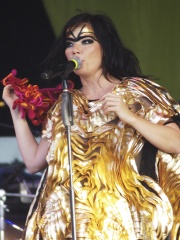
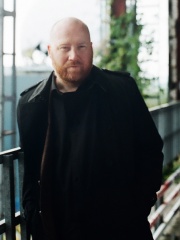
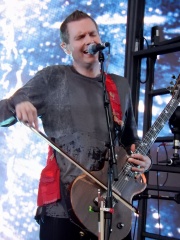
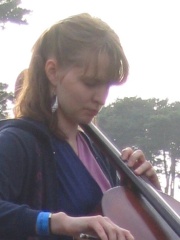
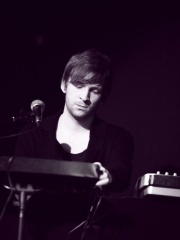
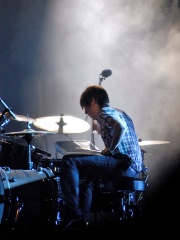
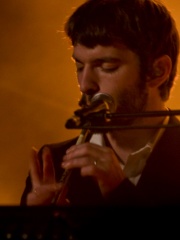
The Most Famous
MUSICIANS from Iceland
Top 8
The following people are considered by Pantheon to be the most legendary Icelander Musicians of all time. This list of famous Icelander Musicians is sorted by HPI (Historical Popularity Index), a metric that aggregates information on a biography's online popularity.

1. Björk (b. 1965)
With an HPI of 68.97, Björk is the most famous Icelander Musician. Her biography has been translated into 92 different languages on wikipedia.
Björk Guðmundsdóttir ( BYURK, Icelandic: [pjœr̥k ˈkvʏðmʏntsˌtouhtɪr̥] ; born 21 November 1965), known mononymously as Björk, is an Icelandic singer, songwriter, composer, record producer, and actress. Noted for her distinct voice, three-octave vocal range, and eccentric public persona, she has developed an eclectic musical style over a career spanning four decades, drawing on electronica, pop, dance, trip hop, jazz, and avant-garde music. She is one of the most influential pioneers in electronic and experimental music. Born and raised in Reykjavík, Björk began her music career at the age of 11 and gained international recognition as the lead singer of the alternative rock band the Sugarcubes by the age of 21. After the Sugarcubes disbanded in 1992, Björk gained prominence as a solo artist with her albums Debut (1993), Post (1995), and Homogenic (1997), which blended electronic and avant-garde music and achieved significant critical success. Her later albums saw further experimentation, including the glitch-influenced Vespertine (2001), a cappella album Medúlla (2004), pop-focused Volta (2007), and Biophilia (2011), an interactive album with an accompanying iPad app. Following the death of her longtime co-producer Mark Bell, she collaborated with Venezuelan artist Arca on her albums Vulnicura (2015) and Utopia (2017), while Fossora (2022) marked her first venture as a sole producer. With sales of over 40 million records worldwide, Björk is one of the best-selling alternative artists of all time. Several of her albums have reached the top 20 on the US Billboard 200 chart. Thirty-one of her singles have reached the top 40 on pop charts around the world, with 22 top 40 hits in the UK, including the top-10 singles "It's Oh So Quiet", "Army of Me", and "Hyperballad" and the top-20 singles "Play Dead", "Big Time Sensuality", and "Violently Happy". Her accolades and awards include the Order of the Falcon, five BRIT Awards, and 16 Grammy nominations (including nine in the Best Alternative Music Album category, the most of any artist). In 2015, Time named her one of the 100 most influential people in the world. Rolling Stone named her the 64th-greatest singer and the 81st-greatest songwriter of all time in 2023. Björk starred in the 2000 Lars von Trier film Dancer in the Dark, for which she won the Best Actress Award at the 2000 Cannes Film Festival, and was nominated for the Academy Award for Best Original Song for "I've Seen It All". Björk has also been an advocate for environmental causes in Iceland. A retrospective exhibition dedicated to Björk was held at New York's Museum of Modern Art in 2015.

2. Jóhann Jóhannsson (1969 - 2018)
With an HPI of 54.04, Jóhann Jóhannsson is the 2nd most famous Icelander Musician. His biography has been translated into 31 different languages.
Jóhann Gunnar Jóhannsson (Icelandic pronunciation: [ˈjouːhan ˈjouːhansɔn]; 19 September 1969 – 9 February 2018) was an Icelandic composer who wrote music for a wide array of media including theatre, dance, television, and film. His work is stylised by its blending of traditional orchestration with contemporary electronic elements. Jóhann released solo albums from 2002 onward. In 2016, he signed with Deutsche Grammophon, through which he released his last solo album, Orphée. Some of his works in film include the original scores for Denis Villeneuve's Prisoners, Sicario, and Arrival, and James Marsh's The Theory of Everything. Jóhannsson was nominated for an Academy Award for Best Original Score for both The Theory of Everything and Sicario, and won a Golden Globe for Best Original Score for the former. He earned a second Golden Globe nomination for Arrival. He was a music and sound consultant on Mother!, directed by Darren Aronofsky in 2017. His scores for Mary Magdalene and Mandy were released posthumously. His only directorial work, Last and First Men, premiered at the Manchester International Festival in 2017, where he also performed the score live with the BBC Philharmonic Orchestra.

3. Jónsi (b. 1975)
With an HPI of 49.61, Jónsi is the 3rd most famous Icelander Musician. His biography has been translated into 32 different languages.
Jón Þór "Jónsi" Birgisson (pronounced [ˈjouːn ˈθouːr ˈpɪrcɪsɔn, ˈjounsɪ] ; born 23 April 1975) is an Icelandic musician; he is the vocalist and multi-instrumentalist for the Icelandic post-rock band Sigur Rós. He is known for his use of a cello bow on guitar and his falsetto or countertenor voice. Jónsi released his debut solo album Go on 5 April 2010. His second album, Shiver, was released on 2 October 2020. He released his third album Obsidian a year later in conjunction with an art exhibition of the same name. He has also collaborated with his ex-partner Alex Somers and has contributed to the scores for the films How to Train Your Dragon and We Bought a Zoo.

4. Hildur Guðnadóttir (b. 1982)
With an HPI of 48.75, Hildur Guðnadóttir is the 4th most famous Icelander Musician. Her biography has been translated into 36 different languages.
Hildur Ingveldardóttir Guðnadóttir (born 4 September 1982) is an Icelandic musician and composer. A classically trained cellist, she has played and recorded with the bands Pan Sonic, Throbbing Gristle, Múm, and Stórsveit Nix Noltes, and has toured with Animal Collective and Sunn O))). She has received various accolades, including an Academy Award, two Grammy Awards, and a Primetime Emmy Award. Hildur has gained international recognition for her film and television scores, including Journey's End (2017), Mary Magdalene (2018), Sicario: Day of the Soldado (2018), Todd Field's Tár and Sarah Polley's Women Talking (both 2022). For her score for Todd Phillips' psychological thriller film Joker (2019), she won the Academy Award for Best Original Score, the BAFTA Award for Best Original Music, and the Golden Globe Award for Best Original Score, making her the first solo female composer to win in all three. She is also known for her work on the HBO miniseries Chernobyl (2019), which won her a Primetime Emmy Award, a BAFTA TV Award and a Grammy Award.
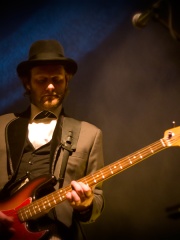
5. Georg Hólm (b. 1976)
With an HPI of 47.61, Georg Hólm is the 5th most famous Icelander Musician. His biography has been translated into 18 different languages.
Georg "Goggi" Hólm (Icelandic pronunciation: [ˈcɛːɔrk ˈkɔcːɪ ˈhoulm]; born 6 April 1976) is the bassist of the Icelandic post-rock band Sigur Rós. He is the most prominent member of Sigur Rós in the English press, as he does significantly more press than the other members due to him being the most fluent English speaker in the band.

6. Ólafur Arnalds (b. 1986)
With an HPI of 46.59, Ólafur Arnalds is the 6th most famous Icelander Musician. His biography has been translated into 28 different languages.
Ólafur Arnalds (Icelandic pronunciation: [ˈouːlavʏr ˈartnalts]; born 3 November 1986) is an Icelandic multi-instrumentalist and producer from Mosfellsbær, Iceland. He mixes strings and piano with loops and beats, a sound ranging from ambient/electronic to atmospheric pop. He is also the former drummer for hardcore punk and metal bands Fighting Shit, Celestine, and others. In 2009, Ólafur also formed an experimental techno project, entitled Kiasmos, with Janus Rasmussen from the Icelandic electro-pop band Bloodgroup, announcing his electronic debut album in 2014. In 2013, Ólafur composed the score for the 2013 ITV series Broadchurch, for which he won the 2014 BAFTA TV Craft Award for Best Original Music. In 2020, Ólafur was nominated for a Primetime Emmy Award for Outstanding Original Main Title Theme Music, for his title theme to Apple TV+ series Defending Jacob. In 2021, he was nominated in two categories at the 64th Annual Grammy Awards. "Loom (feat. Bonobo)" was nominated in the Best Dance/Electronic Recording category and "The Bottom Line" was nominated in the Best Arrangement, Instrumental and Vocals category. Both songs appear on his fifth studio album Some Kind of Peace (2020). Since late 2025, Ólafur has hosted a radio programme on the digital-only UK station BBC Radio 3 Unwind at least once a week titled Ultimate Calm, which is normally broadcast between 21 and 22 o'clock.

7. Orri Páll Dýrason (b. 1977)
With an HPI of 37.22, Orri Páll Dýrason is the 7th most famous Icelander Musician. His biography has been translated into 14 different languages.
Orri Páll Dýrason (Icelandic pronunciation: [ˈɔrːɪ ˈpʰautl ˈtiːrasɔn]; born on 4 July 1977) is an Icelandic musician. From 1999 till 2018 he was the drummer for the band Sigur Rós, which he joined in 1999, shortly after the recording of the studio album Ágætis byrjun, when the previous drummer, Ágúst Ævar Gunnarsson, left the band. Orri has recorded five studio albums with Sigur Rós: ( ) (2002), Takk... (2005), Með suð í eyrum við spilum endalaust (2008), Valtari (2012), and Kveikur (2013). He also contributed to Hvarf/Heim (2007), where "Hvarf" contains studio recordings of previously unreleased songs.

8. Kjartan Sveinsson (b. 1978)
With an HPI of 36.13, Kjartan Sveinsson is the 8th most famous Icelander Musician. Her biography has been translated into 15 different languages.
Kjartan Sveinsson (Icelandic pronunciation: [ˈcʰar̥tan ˈsveinsɔn]; born 2 January 1978) is an Icelandic musician who is the keyboardist for the post-rock band Sigur Rós. He joined the band in 1998. A multi-instrumentalist, he has also played such instruments as the flute, tin whistle, oboe, guitar and the banjo, as well as many of the unorthodox instruments that contribute to Sigur Rós's distinctive sound.
People
Pantheon has 8 people classified as Icelander musicians born between 1965 and 1986. Of these 8, 7 (87.50%) of them are still alive today. The most famous living Icelander musicians include Björk, Jónsi, and Hildur Guðnadóttir. The most famous deceased Icelander musicians include Jóhann Jóhannsson. As of April 2024, 1 new Icelander musicians have been added to Pantheon including Orri Páll Dýrason.
Living Icelander Musicians
Go to all RankingsBjörk
1965 - Present
HPI: 68.97
Jónsi
1975 - Present
HPI: 49.61
Hildur Guðnadóttir
1982 - Present
HPI: 48.75
Georg Hólm
1976 - Present
HPI: 47.61
Ólafur Arnalds
1986 - Present
HPI: 46.59
Orri Páll Dýrason
1977 - Present
HPI: 37.22
Kjartan Sveinsson
1978 - Present
HPI: 36.13

